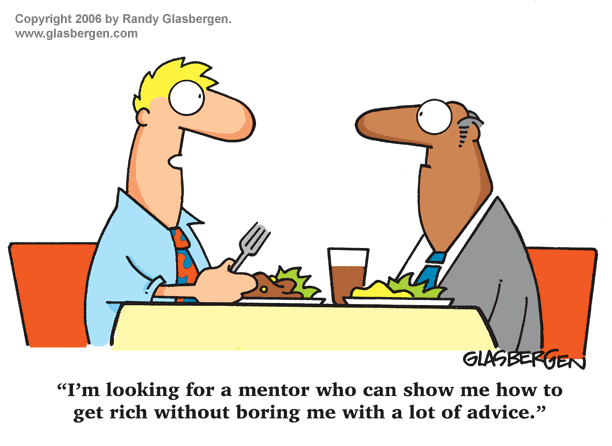
BY
NATIONAL HUMAN RESOURCE CENTRE MALAYSIA
MANAGEMENT,
SMEBIZ, MONDAY 13 JULY 2015
When
done right,
mentoring
is a beneficial process
in
which both the experienced person and the person being guided
gain
in terms of
morale,
sense of accomplishment,
transference
of knowledge and
building
of contacts
Mentoring is a
professional relationship in which an experienced person assists another in
developing specific skills and knowledge that will enhance the lee-experienced
person’s professional and personal growth.
Mentoring is a growing trend in organizations as business leaders note
its positive influence in their own lives.
Being mentored can be
considered one of the better ways to advance in career. Many employees, managers, and entrepreneurs
these days build informal relationships with an experienced advisor or coach to
help them achieve their career goals. Mentoring
programs can shorten one’s learning time, speed up managerial capabilities and
develop leaders.
Mentoring can be
beneficial for both mentor and mentee. Mentees
have noted that mentoring relationships have helped raise their:
·
morale,
·
increase their functional capabilities, and
·
contribute to knowledge sharing
While
mentors get to:
·
polish their coaching skills
·
expand excess to information,
·
build contacts, and
·
gaining sense of well-being
Many
are still confuse with the terms ‘mentoring’ and ‘coaching’.
COACHING
A set of systematic
steps to empower the person being coached to gain courage, capabilities, and
commitment.
It is a means of
providing feedback to sustain and improve performance
MENTORING
A process by which a
wise and helpful guide or advisor uses experience to show a person how to avoid
mistakes made earlier in his career or otherwise help advance the individual’s
career.
A mentor need not be
older than the mentee. Someone becomes a
mentor because that person has the knowledge and experience that the other
party can benefit from. The learning
process is both ways. They are
individuals who are willing to invest their personal time to help others
achieve something more.
Mentoring is an ongoing
process, thus traditionally, the nature of mentoring has several key
characteristics:
1.
focus on career advancement
2.
mentor as a protector
a.
advocate
b.
using network to support mentee’s progress and mobility
3.
a desire to clone look-alike leaders
4.
mentoring base on selected few
a.
to take in high potential employees into the
inner management circle
5.
lack of corporate mission or strategy
6.
development of hidden talent
Mentors can teach the ‘unwritten
rules of the organization’ as well as skills, abilities and knowledge. Organizations use mentoring programs for
variety of reasons:
1.
cater to the interest of special groups
2.
support knowledge management
3.
learning technical skills for senior executives
4.
prepare expatriates for overseas assignment
Key points to ensure
the quality of mentoring:
1.
understanding when mentoring is appropriate,
and effective intervention in relation to other people learning and development
option
2.
oversee, train and develop pool of appropriately
qualified mentors
3.
consider how mentors can be matched to those
who are in need of mentoring
4.
be clear about the different types of mentoring
5.
take responsibility for setting up contractual arrangements
and
6.
develop mechanism to evaluate the effectiveness
of mentoring activities
Mentoring is ultimately
about individual relationships and how they enable participants to transfer
knowledge and experience.


No comments:
Post a Comment